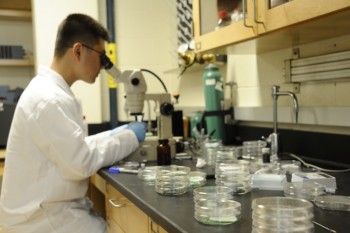Five Young Alumni Earn National Science Foundation Graduate Research Fellowships

Details
Five recent Haverford College graduates, Erin Boettcher '12, Emily Dix '12, Jacob Seeley '12, Elizabeth Lamkin '13, and Matthew Smith '13, were recently honored with National Science Foundation Graduate Research Fellowship Program (GRFP) awards. The oldest graduate fellowship of its kind, the GRFP supports outstanding graduate students in science, technology, engineering, and mathematics, and selects recipients who, are expected to“achieve high levels of success in their future and academic careers.”
The fellowship supports three years of graduate-level research with a $32,000 annual stipend, a $12,000 cost-of-education allowance, and international research and professional development opportunities.
Boettcher, who majored in astrophysics at Haverford, will use her fellowship to fund the next three years of her astronomy Ph.D. program at the University of Wisconsin-Madison. She is currently in her second year of studying warm ionized gas in spiral galaxies, such as our own Milky Way Galaxy, with Professors Ellen Zweibel and Jay Gallagher.“Due to my Haverford experience, I hope to become a professor at a small liberal arts college where teaching plays an important part in my career,” she says.“During my fellowship, I will participate in UW-Madison's Delta Program in Research, Teaching, and Learning, [which] is designed to prepare graduate students in STEM fields for careers that involve inclusive and effective instruction of diverse audiences.”
Haverford psychology major Dix will use her fellowship to further her research on racial prejudice with Professor Patricia Devine at the University of Wisconsin-Madison. Dix, who is finishing up her first year in the university's psychology Ph.D. program, studies the different concerns that people have as they anticipate, and then engage in, race-related discussions, and hopes such research can ultimately inform efforts to foster more positive interracial interactions.“The social justice emphasis of my coursework [at Haverford], along with experiences as a Center for Peace and Global Citizenship intern and a Haverford House Fellow, cultivated my desire to understand why racial tension persists,” says Dix.“I'm grateful that Haverford provided not only an intellectual sphere for learning about social issues, but also opportunities to spend time in different settings seeing how some of these issues play out beyond the classroom.”
Former physics major and philosophy minor Seeley will use his fellowship to support his research on clouds and atmospheric dynamics at the University of California at Berkeley, where he has been working with Assistant Professor David Romps since January 2013. His goal is to improve our understanding of the climate system and to establish an atmospheric science outreach program at an Oakland, Calif., middle school.“Ultimately, I think I would like to be a professor—possibly even at a place like Haverford,” says Seeley, who was inspired to go to graduate school by the work he did here on campus with Associate Professor Peter Love.“Climate change is, in many ways, the perfect interdisciplinary problem for a student at a liberal arts college to confront, but there aren't yet many professors at such institutions running the kind of physics-based climate research program I want to run.”
Lamkin, who majored in biology with a concentration in neural and behavioral sciences at Haverford, is currently a first-year graduate student at Harvard University's neuroscience Ph.D. program and her fellowship will continue to fund her studies there. Though she is rotating through different labs at Harvard and is still undecided about her dissertation topic, she is inspired by the work done in Max Heiman's lab at Boston Children's Hospital, which seeks to understand how nerve cell shape is encoded in the genome, and she will likely continue on that research path.“Haverford has absolutely changed the way I approach a research problem and has also fundamentally shaped my research interests,” she says.“When someone is truly excited by a scientific problem, it is contagious.”
Smith will use his fellowship to fund his chemistry Ph.D. studies at Stanford University, which he began last summer. The Haverford chemistry major, who also graduated with a mathematics minor and a concentration in scientific computing, is focused on developing new materials for traditionally difficult catalytic transformations with an eye towards renewable energy applications. Though he now works with Stanford Assistant Professor Hemamala Karunadasa, he also credits his Haverford mentors, specifically Associate Professor Alexander Norquist and Assistant Professor Joshua Schrier, for influencing his academic career and goals.“They both inspired me to push the boundaries of my own knowledge and to explore research problems that are not just scientific curiosities, but whose solutions can exert significant beneficial impacts on modern society,” says Smith.
-Rebecca Raber
Read more about Fords earning awards, fellowships, honors, and scholarships.



